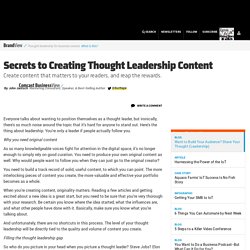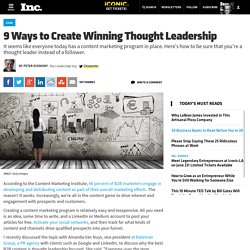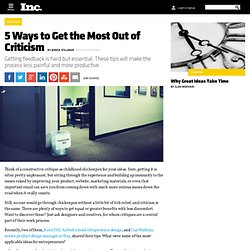

These 7 Questions Will Change Your Life. At the end of every day or week comes the important act of self-reflection. Without this brief moment of pause, our moral and spiritual growth would be undeniably stilted. How, then, do we go about achieving such internal clarity and self-awareness? Usually through the act of self-questioning. Read on for 7 questions you should be asking yourself every day. 1. The easiest question to start with is the positive one, by far. 2. Looking back, pick out the things that really jump out at you. 3. After understanding and accepting your action comes attacking it for the better.
Secrets to Creating Thought Leadership Content. Everyone talks about wanting to position themselves as a thought leader, but ironically, there's so much noise around the topic that it's hard for anyone to stand out.

Here's the thing about leadership: You're only a leader if people actually follow you. Why you need original content As so many knowledgeable voices fight for attention in the digital space, it's no longer enough to simply rely on good curation. 7 Steps To Transform Yourself From Who You Are To Who You Want To Be. Four Work Habits You Need To Change At Each Stage Of Your Career. I accepted my first management role early in my career, heading up a 15-person team at GE Global Research's semiconductor laboratory.

It was a big step at the time, but today I manage 28 labs of over 500 people, in addition to our research headquarters with around 2,000 people on site. 11 Signs That You're an Incredibly Valuable Employee. How Leaders Hold Employees Accountable. 3 Questions That Are Way Better Than 'What's My Passion?' How to Be Exceptionally Likable: 11 Things the Most Charming People Always Do. Untitled. 4 Factors That Advance Your Career (That Have Nothing To Do With You) 5 Ways You Can Position Yourself As A Leader (Before You Have Any Followers)
9 Ways to Create Winning Thought Leadership. According to the Content Marketing Institute, 86 percent of B2B marketers engage in developing and distributing content as part of their overall marketing efforts.

The reason? It works. Increasingly, we're all in the content game to drive interest and engagement with prospects and customers. Creating a content marketing program is relatively easy and inexpensive. 5 Ways to Get the Most Out of Criticism. Think of a constructive critique as childhood chickenpox for your ideas.

Sure, getting it is often pretty unpleasant, but sitting through the experience and building up immunity to the issues raised by improving your product, website, marketing materials, or even that important email can save you from coming down with much more serious issues down the road when it really counts. Still, no one would go through chickenpox without a little bit of itch relief, and criticism is the same.
Managing Your Boss. A quarter-century ago, John Gabarro and John Kotter introduced a powerful new lens through which to view the manager–boss relationship: one that recognized the mutual dependence of the participants.

The fact is, bosses need cooperation, reliability, and honesty from their direct reports. Managers, for their part, rely on bosses for making connections with the rest of the company, for setting priorities, and for obtaining critical resources. If the relationship between you and your boss is rocky, then it is you who must begin to manage it. When you take the time to cultivate a productive working relationship—by understanding your boss’s strengths and weaknesses, priorities, and work style—everyone wins. In the 25 years since it was published, this article has truly improved the practice of management. Tuning In: How to Listen Better - WSJ. Why You May Be Terrible At Giving Feedback. The Emotional Boundaries You Need at Work - Greg McKeown.
By Greg McKeown | 8:00 AM July 24, 2014 To develop meaningful and mature relationships at work or at home we need to develop two filters.

The first filter protects you from other people. The second filter protects other people from you. Filter 1: protect yourself from others. I once worked with a manager who gave blunt feedback in perpetuity: “You’re not a grateful person!” Making Yourself Indispensable. Artwork: Vincent Fournier, Space Project: MDRS #04, Mars Society, 2008, U.S.A.

A manager we’ll call Tom was a midlevel sales executive at a Fortune 500 company. After a dozen or so years there, he was thriving—he made his numbers, he was well liked, he got consistently positive reviews. He applied for a promotion that would put him in charge of a high-profile worldwide product-alignment initiative, confident that he was the top candidate and that this was the logical next move for him, a seemingly perfect fit for his skills and ambitions. His track record was solid. He’d made no stupid mistakes or career-limiting moves, and he’d had no run-ins with upper management. As far as Tom could tell, nothing. How to Succeed at Office Politics. Are You Ready For Your Next Promotion? Secrets of Being Promoted and Earning More Money.